“The Earth can shake us off whenever it feels like and continue to exist, but it is we, as humans, who bear the responsibility of safeguarding our existence and nurturing our cohabitation with this planet. So, the messaging in climate change awareness campaigns should be ‘save the human race from extinction’ rather than ‘save mother Earth”. Maybe then people will realize the urgency.”
~ Ms. Gitanjali Rajamani
Co-founder and COO
Farmizen
Email: support@farmizen.com
Sejal Agarwal and Bhuvana N recently interacted with Gitanjali Rajamani to know how Farmizen is promoting organic farming by providing a transparent marketplace for farmers and providing access to quality chemical-free organic produce to consumers. Follow their conversation to know about Farmizen and Gitanjali’s journey as an entrepreneur.
| Farmizen (https://www.farmizen.com/), a startup company based in Bengaluru, has set out to build a food ecosystem that’s better for consumers, farmers and the planet. Its theme, “Your plants, your food, Our Future” is fulfilled by the values of trust, collaboration, empowerment, and sustainability engrained in its operations. It delivers organic produce grown by local farmers via Farmizen e-shop (https://shop.farmizen.com/welcome) and also via its Farmizen app (https://play.google.com/store/apps/details?id=com.farmizen.farmizen&hl=en&gl=US&pli=1). |
How did Farmizen start?
It all started in 2017 when three close friends, Mr. Shameek Chakravarty, Mr. Sudaakeran Balasubramanian and I came together to create something truly special. Inspired by the popular online game Farmville, we embarked on a mission to provide organic and traceable food to consumers. We came across videos exposing the use of harmful chemicals in food crops, which raised concerns about the impact on our well-being. Despite the presence of regulatory bodies, we recognized the gaps in implementing relevant policies and checks. Driven by a sense of responsibility to address the issue and ensure that people can access safe and chemical-free food, we developed a mechanism whereby consumers know whose produce they are buying, its origin, what cultivation practices the farmers are practicing, if the produce is purely organic, etc. Not every consumer can afford to get their produce tested for chemicals or check the quality or authenticity of the food they consume.
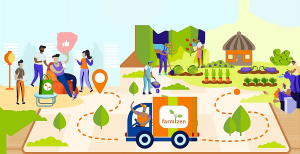 Farmizen model inspired from Farmville game
Farmizen model inspired from Farmville game
Can you elaborate on your business model?
We established Farmizen as a private limited company based at Bengaluru in 2017. Our initial model involved the renting out of patch of farmland by city dwellers who would decide what they want to produce. We identified a few farmers who would grow it for them, harvest it, and get it delivered to their homes. Farmizen ran this model successfully for two years with more than 30 farms in Bengaluru, Hyderabad, Pune, and a few in Surat. However, we realized that it is a very niche model that would be difficult to scale up.
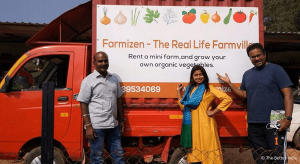 Founders of Farmizen with their first model
Founders of Farmizen with their first model
In 2019, Farmizen underwent a significant transformation by establishing itself as a marketplace for organic produce. This shift was driven by the realization that a vast majority of smallholder farmers in India faced challenges in reaching consumers directly. Often, they had to rely on intermediaries, which resulted in unfavorable pricing for their produce. Moreover, consumers purchasing from middlemen had limited knowledge about the farmers and the inputs used in the production process. Recognizing these issues, Farmizen set out to address them through its marketplace platform. By connecting farmers directly with consumers, we aimed to enable traceability to the food supply chain. This meant that consumers could learn about the farmers behind the produce they purchased, understand the farming practices they employ, and have confidence in the organic nature of the produce. Simultaneously, by eliminating intermediaries, Farmizen sought to ensure that farmers receive fair prices for their hard work and dedication.
In essence, the marketplace model developed by Farmizen had a dual purpose: to empower both farmers and consumers while establishing a transparent and sustainable ecosystem. By facilitating traceability, Farmizen aimed to foster trust and provide a fair market for smallholder farmers, ensuring they receive a good price for their produce, and creating opportunities for improved livelihoods. In addition to the marketplace, Farmizen took another significant step by launching the Facebook group ‘Organic Farming India,’ with a membership of over 2.3 lakhs. This group serves as an invaluable online platform, connecting organic farmers with customers across the entire country. It functions as a vibrant community, facilitating interactions, knowledge sharing, and enabling organic farmers to directly engage with potential customers. Through this platform, we also try to strengthen the organic farming approach and promote sustainable practices in India.
How has technology transformed your operations at Farmizen?
Professionally we are techies. So, definitely technology has played a pivotal role in enabling Farmizen to function effectively. To mention a few instances:
 Farmizen technology
Farmizen technology
- Traceability: With the aid of technology, both consumers and farmers can easily trace the details of the produce. Through the Farmizen app, customers can place orders, access information about the farm’s location, and gain insights into the cultivation process. This seamless integration of technology has successfully established a strong connection between farmers and customers.
- Logistics management: Farmizen allocates approximately 15% of its costs to logistics management. Leveraging technology, we have streamlined our delivery mechanism, optimized routes, and ensured efficient transportation. By incorporating features like route planning for pick-ups and delivery, we have been able to effectively monitor and control our costs.
- Demand and supply forecasting: Digital innovations have empowered Farmizen to accurately predict demand and supply dynamics. By leveraging data collected over time, we can now anticipate customer preferences based on choices, seasonal variations, and festivals. We are now able to project the required quantity of specific crops and approach farmers accordingly. This data-driven approach minimizes wastage and reduces food losses. At Farmizen, our wastage rate is less than 5%, significantly lower than other enterprises.
In addition to our App, we are also active on social media platforms like Facebook (https://www.facebook.com/farmizen/); Instagram (https://www.instagram.com/farmizenofficial/); twitter (https://twitter.com/farmizen); YouTube (https://www.youtube.com/channel/UCt9z-GvB7_kH8k4pHd2VztA) and also WhatsApp.
Through these technological advancements, we have revolutionized our operations, fostering transparency, optimizing logistics, and ensuring efficient demand and supply management. Such innovations have propelled us closer to our goal of providing organic and traceable food while minimizing waste and enhancing the livelihoods of farmers.
What is Farmizen’s scale of operations?
We are mainly present in Bengaluru and have a small presence in Hyderabad now. We currently have more than 35,000 customers and are connected with more than 8,000 farmers pan India.
How does Farmizen work?
We mainly handle the initial phase of the supply chain, which involves collecting produce from our farmer partners, even in small quantities, and listing it on our app. Occasionally, farmers themselves transport their produce to Farmizen. Once the produce is received, our team does the sorting, grading, and packaging based on the customers’ orders. Subsequently, we deliver the packaged produce to the customers. While we get produce from farmers across India, the vegetables and greens we offer originate from farms located nearby. Vegetable farms are situated within a radius of 40-60 km, while greens are sourced from farms within a radius of 20-25 km. In our procurement process, we take various factors into consideration, such as the season and occasion. For instance, during the mango season, mangoes contribute significantly to our revenue, accounting for almost half of our total earnings in that season.
How do you identify farmers for the supply of produce?
We employ various strategies to identify farmers and establish partnerships. Most of our farmers have gotten to know about Farmizen through their networks and have reached out to us. For others, we utilize online resources, such as internet searches for organic farmers in Karnataka whom we approach to become Farmizen partners. We attended a few workshops on natural and organic farming, and these often open up opportunities to connect with farmers. We also reach out to relevant institutions like government organic farming departments, etc., to gather information or establish connections with potential partners. Our Facebook group mainly serves as a platform for engaging with more farmers.
In addition, word of mouth and references play a crucial role in farmer identification. Farmers already associated with Farmizen can recommend us to other farmers practicing organic farming. Additionally, the dissemination of Farmizen-related videos and articles on the internet helps raise awareness about our objective of bringing organic farmers together. The organization receives enquiries from farmers across India. There is a form on our website that farmers can fill in with their requests, following which we contact them.
How easy/difficult is it to retain farmers in the long run?
For every farmer, there is an initial trust building period where we have shorter credit periods or instant payment cycles of 2-3 days. However, the credit period extends to 15-20 days as trust builds between us and our client farmers. While most farmers are selected through references and word of mouth, for completely new farmers, we arrange for an agronomist to check some of their produce. If the farm is located near Bengaluru, an agronomist is sent to inspect the farm. We encourage farmers to practice crop diversification by growing multiple crops. This win-win approach benefits soil health and also allows us to procure different varieties of produce from a single farmer. Although we engage with farmers, they are free to sell their produce to others. We communicate our requirements in advance, and any remaining produce can be sold in the open market. However, the price offered in the open market is generally lower than the price paid by Farmizen; So farmers prefer us for selling their produce.
How unique is Farmizen compared to your competitors?
Farmizen distinguishes itself through its unique selling proposition (USP), which is the provision of detailed information about the farm and farmer for each agricultural product it offers. This approach gives farmers the recognition they deserve for producing quality produce. We believe that by establishing a direct connection between farmers and consumers, it fosters trust and accountability. When farmers know their consumers, they are less likely to compromise the quality and safety of the food they grow. Similarly, when consumers have knowledge about the farmers behind the produce, they are less inclined to haggle over prices. This strategy has successfully cultivated a sense of community and rapport between the two parties, leading to instances of consumers specifically requesting for crops from specific farmers. This appreciation boosts farmers’ morale and encourages them to dedicate more efforts in organic farming.
In contrast to food delivery platforms that prioritize quick delivery, we have opted for a different approach. We have deliberately chosen not to keep excess stock, as it would result in wastage. Recognizing that food wastage contributes significantly to climate change (accounting for approximately 30% of it, according to studies), we aim to minimize repercussions on the environment. Rapid delivery would require more resources for transportation, escalating costs, and negatively affect the business. By prioritizing sustainability and minimizing wastage, we set ourselves apart from competitors in the market.
Despite being a growing company, we actively engage with small-scale farmers across India. Our goal is to source diverse and rare varieties of produce, including wild leafy vegetables, drumstick flowers, balloon vine, and more. With a streamlined delivery process, we can efficiently transport perishable items such as jamun within 24 hours, something larger aggregators struggle with due to storage losses. Our ability to provide such unique produce expands our market reach and satisfies customers’ demand for unconventional produce.
How does Farmizen reach customers?
We offer a range of options to supply our produce:
Subscription-based model: Customers can opt for a monthly subscription that has a fee ranging from ₹ 1000 to ₹ 4000. They receive a selection of fruits, vegetables, salad boxes, etc., delivered at regular intervals, typically on a weekly basis. We also provide a mini subscription box designed for individuals or couples, weighing around 4-5 kg per box. The vegetable subscription boxes contain a variety of vegetables, including staples, leafy greens, and exotic produce based on the customer’s preference. For larger households of 3-4 members, we offer a regular vegetable box weighing approximately 8-10 kg, priced at around ₹ 2500 per month, delivered weekly. In an effort to minimize wastage, any surplus crop is included as a bonus to subscription customers. This not only reduces waste but also generates excitement among customers, leading to positive word-of-mouth referrals.
Pre-orders: We inform customers about the produce available and the respective farmers associated with it. Customers can place pre-orders based on their preferences. We purchase the requested items from farmers, maintaining a buffer of around 5% to account for potential wastage. The ordered produce is then delivered to customers the following day. This approach enables us to closely monitor and manage wastage.
Daily orders: Customers have the flexibility to place orders on a daily basis, without any minimum quantity or amount specification. The majority of our customers fall in this category, allowing us to cater to diverse preferences and varying needs.
Our package of options mainly focusses on convenience and customization, allowing customers to choose the most suitable way to receive fresh and sustainable produce.
How do you deliver the orders?
Upon receiving the harvested produce, we ensure delivery on the following day. To facilitate this, we ask customers to place their orders by 8 PM the day before. Subsequently, deliveries are scheduled between 6 AM and 10 AM the next day. In order to meet these delivery deadlines, our team works diligently during the night to pack the orders.
We use cold storage specifically for select produce such as fruits, which have a longer shelf life. However, the majority of our food items, particularly vegetables, are promptly delivered to customers the next day to preserve their nutrient levels.
Understanding the requirements of working professionals, especially women, we plan to introduce an evening delivery service to accommodate their needs and provide greater convenience in receiving their orders.
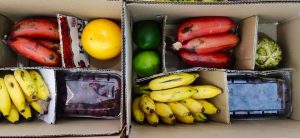 Fruit harvest bundles for delivery
Fruit harvest bundles for delivery
What is the staffing pattern at Farmizen?
We currently have a team of 40 individuals. This includes staff responsible for various warehouse operations such as managing incoming supplies, packing, grading, and quality checking. The core team consists of 10 individuals who handle specific areas of operations, including technical operations, marketing, customer support, procurement, logistics, and the 3 founders.
To enhance our logistics capabilities and accommodate increased seasonal demands, we have partnered with external vendors such as Telyport, Blowhorn, and Porter. This strategic decision serves as an alternative if our primary delivery partners are unavailable, ensuring smooth operations and customer satisfaction.
Could you elaborate on your professional background?
All the founding members of Farmizen come from backgrounds in IT and consulting. I belong to an agriculture family and understand the ups and downs that farmers face in agriculture. I believe that our IT background has been instrumental in enabling us to explore the potential of technology and data analysis in our enterprise. This perspective might not have been as pronounced if we had solely come from an agricultural background. While most team members have an IT background, we also have a few individuals with agricultural expertise.
What’s the profile of your clients/customers?
A majority of our consumers are in the age group of 30-45 years and many of them are new parents. It also includes those who are at ease with using mobile applications. Many home chefs also order from Farmizen. A small percentage of our customers are patients, like those suffering from cancer or who have been medically advised to eat organic produce. However, we have fewer bachelor customers because they generally buy in very small quantities depending upon their need or their cook buys it for them.
How do you generate the revenue to sustain your business model?
Our revenue comes from three different modes. Rates for fruits and vegetables fluctuate based on a mutual agreement between our farmers and our team. This monthly rate is determined by considering prevailing market prices and ensuring fair benefits to both parties. We then add a mark-up on the agreed price before selling the produce to customers. The application displays these rates transparently, allowing farmers to monitor the selling prices set by us.
The mark-up percentage varies with the product. For instance, staples like rice typically have a mark-up of around 15% while the margin is relatively higher on perishable items to account for wastage and transpiration in fruits and vegetables.
In terms of financial performance, our sales amounted to approximately ₹ 16 crores in 2021-22. We incur monthly expenses ranging from ₹ 15-25 lakhs and currently are operationally profitable.
We have raised one round of funding in our rented farm model i.e., of US$ 300,000 and have no loan liabilities.
What learning support did you obtain in your entrepreneurial journey?
Through my co-founder Shameek, I came to know about Goldman Sachs’ 10000 Women Program[1]. I joined it in 2016 and have also been part of their Ambassador Program. These programs helped me hone my entrepreneurial skills and be a part of a women entrepreneur network that has inspired me. Since the program was in collaboration with Indian School of Business (ISB), Hyderabad, it also widened my network, connecting me to different people and mentors. I went with my first start up to the program and also presented the idea of providing traceable organic food to consumers. The appreciation this garnered from my batchmates and mentors motivated me to pursue the idea.
Goldman Sachs started this program in 2008 to provide women in underserved communities around the world with a business and management education. This initiative was started based on a survey which showed that:
|
The course was truly transformative. I had the opportunity to meet and be mentored by esteemed professors. Another important aspect is that the program created an ecosystem that connected me to many women entrepreneurs who have always been very encouraging and supportive in each other’s journey.
What kind of challenges have you experienced in your journey as an entrepreneur?
We faced several challenges, and one of the most important one is the lack of awareness about organic farming among consumers. I believe there is a vicious cycle wherein farmers are forced to poison their land using chemicals due to consumer preference for ‘perfectly shaped and good-looking’ produce. Customers have often come back with questions: is the produce that looks good actually organic? Then we have to explain to them how the produce is grown and why organic produce can look attractive too.
The second important challenge has been in identifying farmers who actually practice organic farming. Though organic farming is actively encouraged, finding farmers who practice it is difficult. There is a need to motivate more farmers to make the transition to organic farming. Farmers face challenges in making a shift from conventional chemical-based farming to natural/organic farming. This indicates the lack of sufficient resources for them to learn from. They also struggle to find these resources online. To tackle this gap in information, we connect them with experienced organic farmers in our region in order to mentor such transitioning farmers.
Thirdly, we took time in understanding our customers, their needs, and demands based on season, occasions, etc. For example, it was a learning experience when we procured the usual quantity of eggs but then sales went down; later, we realized that it was due to Navratri. So, it is important for us to account for these factors while estimating demand and procuring these items.
Apart from these, we faced challenges which most entrepreneurs in all sectors generally face in India, such as poor logistics, including inefficiencies in production and supply systems, tedious company registration process, and getting the right candidates, especially agriculture graduates who are knowledgeable about organic farming to support our operations.
During the days of COVID-19, sales were very high because no one was stepping out for purchases. However, at present, the loss of jobs has meant the lack of disposable income, impacting their purchase preferences like exotic fruits and vegetables. This change impacts our business as our fixed costs are the same. So, keeping a reserve is necessary. We added staff during the pandemic to cater to the increasing demand with a belief that online commerce would prevail. But as the situation changed, we have had to reduce our team size as well.
As a women entrepreneur, have you faced any specific challenges, and if so, how did you tackle them?
Though a lot of work in the field is done by female farmers, land ownership is skewed in favor of men. When I started engaging with male farmers, I experienced some barriers in the free flow of communication owing to the urban-rural divide, my non-farming background, and gender. To tackle this, I had to initially build trust by letting them know of my farming skills and knowledge, telling them about my company, and the benefits they can derive by being a part of it. Many times, being a woman has been an advantage, as in general people are more open with women and trust them more readily.
Mansplaining (explain something to a woman in a condescending way that assumes she has no knowledge about the topic) is a common problem many women entrepreneurs face initially. I too experienced such situations. I adopted a strategy of listening to what was being said but also putting forth my point of view in a non-confrontational manner, thus helping me get work done amicably.
As a women entrepreneur, it is important to navigate through the comments and tantrums people might throw and keep one’s focus on the goal.
What are your key learnings from being an entrepreneur?
One of our learnings is about supporting farmers in their transition to organic farming. Farmers believe other farmers who are practicing organic farming. So, connecting them with each other builds trust and motivates them to make a switch to organic farming. Farmers also need continuous support in training, logistics, and marketing to make a successful transition. For the first three years, when a farmer starts growing organic produce, s/he is not given a certificate. Additionally, the cost of production is a little high as the quantity of produce declines initially when transitioning to organic farming. So, for those three years also, we took their produce and sold it on our platform with a statement saying ‘farm is not using chemicals but is not certified organic’. This shifts the onus of buying the produce on the customer. We shared the cost burden of these farmers and kept them motivated in this journey of transition. We also conduct online meetings with farmers, scientists, and doctors to address their doubts regarding organic farming.
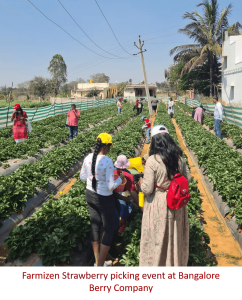 The second aspect is convincing customers and sustaining their loyalty. We periodically organize farmers markets where customers can interact with farmers and see the produce themselves. The team at Farmizen sends articles and newsletters to its customers and posts updates on social media platforms to spread awareness about organic produce. Our team works in shifts 24×7 to fulfill orders and deliver them on time.
The second aspect is convincing customers and sustaining their loyalty. We periodically organize farmers markets where customers can interact with farmers and see the produce themselves. The team at Farmizen sends articles and newsletters to its customers and posts updates on social media platforms to spread awareness about organic produce. Our team works in shifts 24×7 to fulfill orders and deliver them on time.
Thirdly, to maintain business operations smoothly, all members of the core team should have a basic understanding of all the operations so that the exit of any one doesn’t affect business operations. Having three co-founders helps in managing things better; we are able to share roles and responsibilities in a balanced way. In our team, I feel that women are better at grading and sorting compared to men, which even they admit. However, due to night operations, we are not able to hire many women owing to safety and security concerns.
Any special advantage of being a women entrepreneur?
Quite often, people are appreciative that a woman is doing all these activities. So, they are open to conversations and take me seriously. Also, people trust women more readily and that helps.
What keeps you and your team motivated?
Personally, I find it very heart wrenching to see farmers committing suicide, discarding unsold tomatoes onto roads due to poor pricing, setting fields on fire, etc. These are disturbing and have motivated my team to help these farmers improve their crop quality, soil heath, and their living conditions through organic farming. Similarly, people are quick to spend hefty amounts on medical tests and on treating many new ailments without realizing their root cause – the consumption of produce with high levels of toxic chemicals. This too motivates us to spread awareness among people and make traceable organic produce available to them.
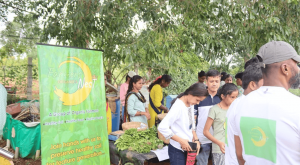 Farmizen-Organic farmers Nest organic market
Farmizen-Organic farmers Nest organic market
Entrepreneurs often face tough times in their professional journey and may feel demotivated to continue. However, the huge number of success stories of farmers and customers keeps us motivated to continue creating impact in this sector. It is heartening to hear farmers describing how their income has increased and how they utilized the money to buy new vehicles, send children to school, build a new house, etc. Similarly, consumers have described the benefits of consuming fruits and vegetables bought from Farmizen and how it has helped in reducing mineral and vitamin deficiencies. Some customers also described how Farmizen produce reminded their grandparents of the taste of vegetables they used to consume in earlier times. Such testimonials always keep me motivated and encourage my team to provide good service to both consumers and producers.
What are your future plans?
We are keen to expand into more cities to help increase the demand for organic produce, thus creating new supply chains for farmers practicing organic farming. We are eager to create a learning program on organic farming for farmers and consumers. This will help farmers learn how to opt for organic farming, the modern machines and equipment available for purchase/rent, establish market connections, good quality input supply, etc.
What’s your advice to emerging entrepreneurs, especially women?
It is important to have a very clear and elaborate three-year plan detailing the problem statement and a business plan to address these, including finances, target audiences, and stakeholders. Perseverance is another quality required to keep the idea going for at least 1-2 years. During the first three years, based on a reflection of past performance, you should have the courage to change course and take corrective action. The ability to evaluate the business model adopted based on emerging contexts is also important. So, be passionate about your idea but also be realistic. In the often-demanding realm of entrepreneurship, women face the added challenge of balancing their professional pursuits with responsibilities at home. Navigating this maze, the unwavering support from and encouragement of families can be a strong pillar to lay a solid foundation to success for women entrepreneurs.
Acknowledgement: This interview was done as part of the IRRI-CRISP ongoing project “Mapping of Good Practices in Digital innovations in India Supporting Women Agrientrepreneurs”.
Foot Note:
[1] https://www.goldmansachs.com/worldwide/india/citizenship/india-10kw.html
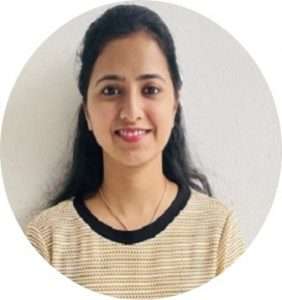 Sejal Agarwal, till recently worked as a Research Fellow at the Centre for Research on Innovation and Science Policy (CRISP), Hyderabad. She recently joined Oorja Development Solutions Limited as Impact Manager She can be reached at sejal.iifm@gmail.com
Sejal Agarwal, till recently worked as a Research Fellow at the Centre for Research on Innovation and Science Policy (CRISP), Hyderabad. She recently joined Oorja Development Solutions Limited as Impact Manager She can be reached at sejal.iifm@gmail.com
 Bhuvana N, is a Consultant at the Centre for Research on Innovation and Science Policy (CRISP), Hyderabad. She has a PhD in Agricultural Extension, from Professor Jayashankar Telangana State Agricultural University, Hyderabad. Her research interests include organizational ecosystems and effectiveness, social networks and technological change. She can be reached at: bhuvanaditya7@gmail.com
Bhuvana N, is a Consultant at the Centre for Research on Innovation and Science Policy (CRISP), Hyderabad. She has a PhD in Agricultural Extension, from Professor Jayashankar Telangana State Agricultural University, Hyderabad. Her research interests include organizational ecosystems and effectiveness, social networks and technological change. She can be reached at: bhuvanaditya7@gmail.com

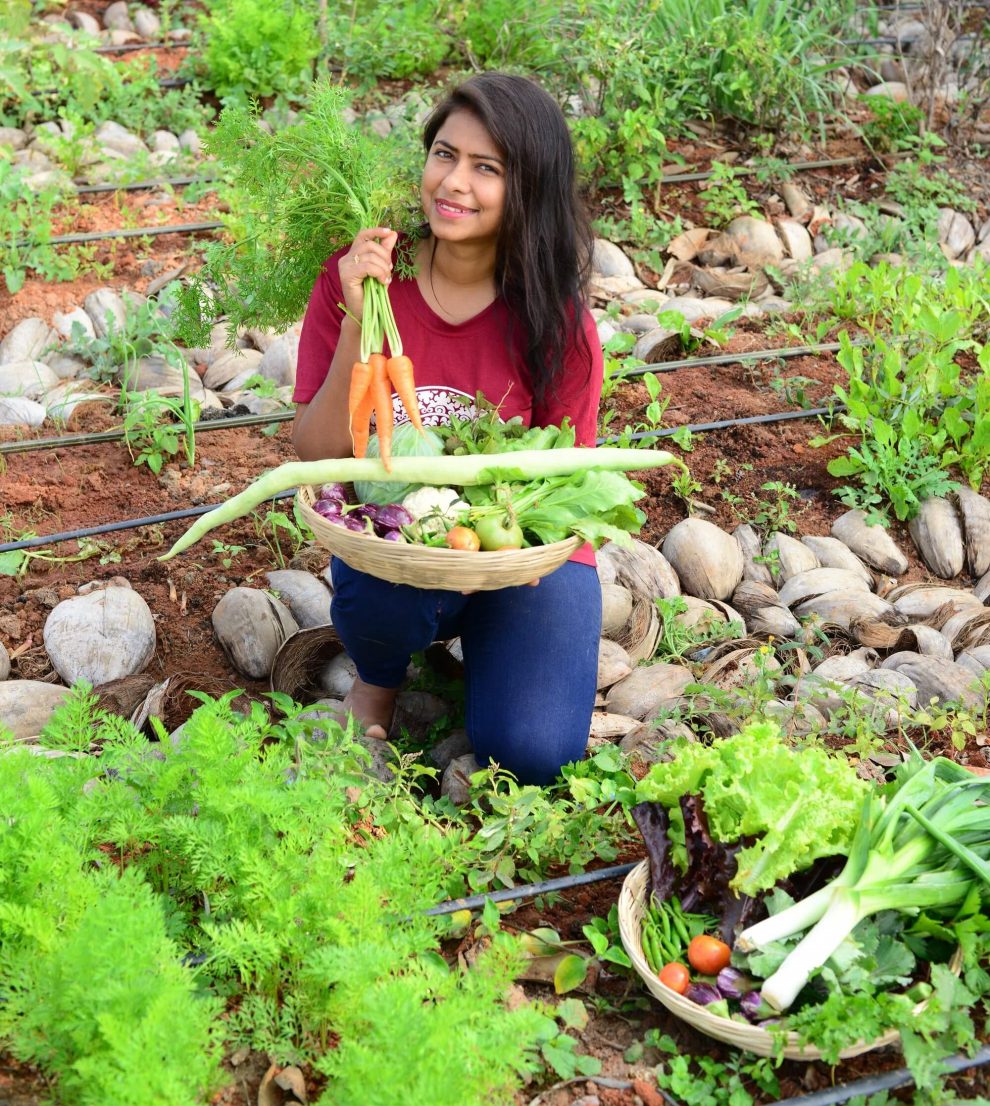



Add Comment